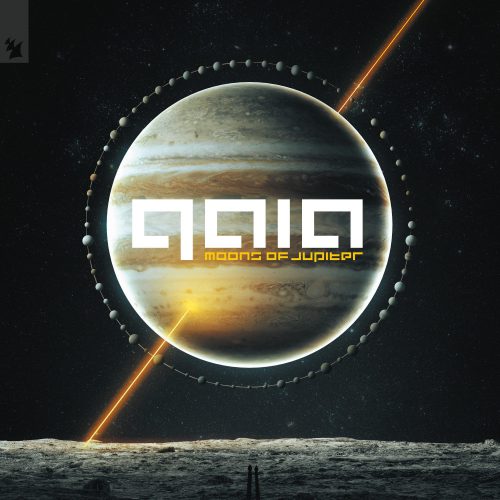Breaking beyond normal is simple for dynamic duo GAIA on their debut album Moons Of Jupiter.
It’s finally here! Legendary trance producer Armin van Buuren and production wizard Benno de Goeji have twisted all expectations with the debut album Moons of Jupiter released under their collaborative alias GAIA. The road to the album’s release is years long but playing the patience game has reaped rewards. In fact, the album is no short affair and makes the journey breathtaking – even as we travel to the far-off planet. So strap in explorers and let’s take a ride.
On Moons of Jupiter, GAIA allows their creative art to carry them instead of dictating the experience instead of a commercially centered approach. Out today, the album is available for the world to experience and it is craftwork! It is a tapestry of sound carved into the sky bound for your ears. Armin stated during his 919th episode of A State Of Trance that this album is one of the things he is most proud of in his career. After giving the album a listen over, I can concur with his emotion. This album may be his best after his 2005 release, Shivers.
Take a listen to this long-awaited album from GAIA on Spotify, download or stream it on your preferred platform, and read on for some insight on Moons Of Jupiter below!
Stream GAIA – Moons Of Jupiter on Spotify:
GAIA’s Moons Of Jupiter offers a full-length listening experience full of passionate production.
The album spawns 21 tracks that are not what you would expect from the man championing the “A State Of Trance” banner and a living trance legend in the production booth. For a brief moment – let’s explore some notes regarding the album:
- Armin and Benno used only one software synthesizer in the entire album
- All other elements of the album are produced through hardware loops
- The album is the result of two years of production effort
- Experience multiple genres: everything from ambient to “melodic techno” to trance
- Vocals are often distorted and used in inventive ways but do not expect any traditional sing-along songs on this album
- There are no collaborations; this is straight up productions by the two of them
So with those notes, one can tell the album is a journey of passion and not a necessity. The twenty-one tracks, unsurprisingly capture the essence of our solar system’s largest planet in a unique manner as well. Each is named after one of Jupiter’s moons – unique locales that express a variety of traits.
Before we dive deep, we’d like to baseline expectations with a couple of insights from the duo on the album’s production process:
Armin van Buuren: “Throughout the years, we created a variety of synths, beats, and loops that were more underground and not always useable for my sound and genre. We always had so much fun exploring different genres and charting different loops and sounds that we felt it was time to combine this under the name GAIA.”
Benno de Goeij: “We’ve really stepped out of our comfort zone, exploring both minimalistic as well as complex sounds, creating track arrangements live on stage rather than in the studio. We even created our own hardware, giving us all the freedom to take people on the journey to the Moons Of Jupiter.”

Examining the tracks, there are influences that one may gravitate towards.
Listening to “Valetudo,” it is easy to hear the acid influences of early trance pioneers like Antiloop. “Amalthea” evokes the moods of mid-2000s Boards of Canada. “Lysithea” has a techno influence from the Drumcode camp during the introduction yet effortlessly mimics the sound of Orkidea and Pryda afterward. Speaking of Pryda, “Himelia” imitates the best of Swedish producer.
“Jupiter LXXI (S/2018J1)” introduces guitar-like synth lines that offer grit below the sparkling upper-level synths. “Thebe” and “Themisto” bring back soft break-beats that permeated 1990s dance music. “Europa” grabs the inner Giorgio Moroder with its chunky bass line, but also pulls elements of Key4050’s sizzling productions. Then there are “Ganymede” and “Io”, which provide familiar territory for the Trancefamily faithful.
There are creative pieces that overwhelm too.
Take “Carpo” – with its heavy bass chomping in the forefront of the track, high in the mix percussion, dark atmosphere it may shock the senses. It, however, does offer a dazzling melodic line over the darkness once the track builds, and in so doing, it captivates the ears.
My favorite track though – as a stand-alone element – is “Callisto”.
It melds the world of Techno, Melodic Tech, and Tech Trance into a swirling pool of energy. Its catchy stab melody is direct, but with little effort plucks along and infects the mind for hours. I won’t spoil the surprise for listeners but the halfway point in the track will be unexpected. It turns expectations on their head and shows the strengths of both producers working together.
Moons Of Jupiter is escape velocity from the everyday norm thanks to GAIA.
While GAIA’s debut may not meet the expectations of Trancefamily fans of “Tuvan”, “Saint Vitus”, or “J’ai Envie De Toi”, it is a stunning tapestry of what happens in the art-making process. This album is not intended to be filled with chart-topping hits – and succeeds greatly at being an enjoyable listening voyage.
Armin and Ruben de Ronde even joked during A State Of Trance Episode 919 about the number of moons may afford tracks on future albums. The massive planet Jupiter currently has seventy-nine (79) total discovered moons; that leaves us with fifty-eight (58) to go on future albums if GAIA retains the theme.
Is Moons of Jupiter album of the year material? No, I would not place it that territory. Is it an album with the power to keep me coming back for more? Indeed, and I’m certain that I will keep coming back to the album for years to enjoy the journey.

GAIA – Moons of Jupiter – Tracklist:
- Metis
- Adrastea
- Amalthea
- Thebe
- Themisto
- Leda
- Himalia
- Jupiter LXXI (S/2018J1)
- Jupiter LXV (S/2017J4)
- Lysithea [Sine Square Noise]
- Elara
- Dia [Computer Electronic]
- Carpo
- Io
- Europa
- Ganymede
- Callisto
- Euporie
- – (Lost) (S/2003J12) [Moons Of Jupiter]
- Valetudo
- Jupiter LX (S/2003J3)








